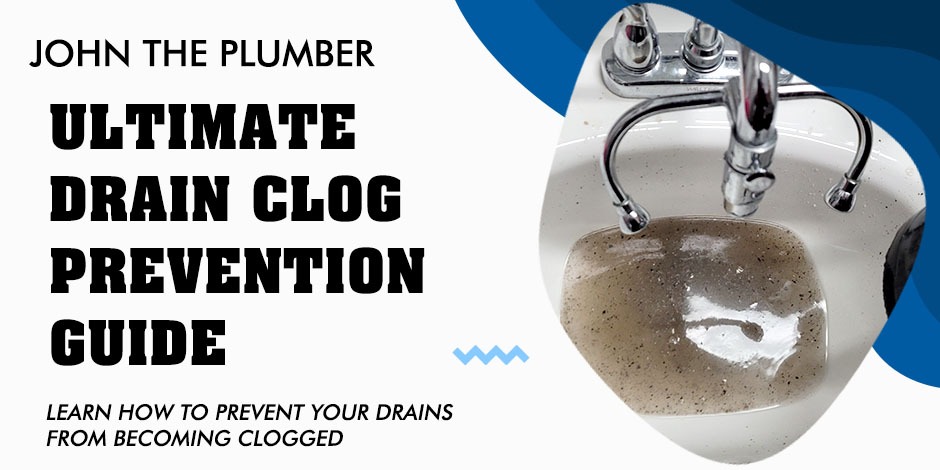The Ultimate Guide to Preventing Clogged Drains and Fixing Them Yourself!
Here is What You Need to Know About Clogged Drains
Dealing with clogged drains can be a frustrating experience, but with the right knowledge and preventive measures, you can minimize the occurrence of blockages and even tackle them yourself. In this comprehensive guide, we’ll provide you with practical tips and techniques to prevent clogged drains and empower you to handle minor blockages on your own.
As your trusted local plumber, John The Plumber is committed to helping you maintain a smoothly functioning plumbing system. With our 5-star service, same-day availability, outstanding customer service, and 2-year warranty on plumbing repairs and installations, we’re here to support you every step of the way.
Be Mindful of What Goes Down the Drain
Prevention is key when it comes to avoiding clogged drains. Be mindful of what you allow to go down your drains, especially in the kitchen and bathroom. Avoid disposing of grease, oils, coffee grounds, and food scraps down the kitchen sink.
Grease and oils can solidify in the pipes, while coffee grounds and food scraps can accumulate and create blockages. Instead, dispose of these items in the trash or consider composting. Install sink strainers to catch food particles and prevent them from entering the pipes.
In the bathroom, avoid flushing anything other than toilet paper down the toilet, and use hair catchers in the shower or bathtub to prevent hair from clogging the drain.
Regularly Clean Your Drains
To maintain proper drainage and prevent blockages, it’s essential to perform drain cleaning practices regularly. One effective method is using a mixture of baking soda and vinegar. Start by pouring half a cup of baking soda down the drain, followed by half a cup of vinegar.
The combination will create a foaming reaction that helps break down residue and keep your drains clear. Let the mixture sit for about 30 minutes, then flush the drain with hot water. This natural solution is safe for your pipes and can be used as a preventive measure every few weeks.
Alternatively, enzymatic drain cleaners can be used to dissolve organic matter and prevent clogs. These cleaners use natural enzymes to break down buildup and keep your drains flowing smoothly.
Hot Water Flush
Another simple yet effective preventive measure is to regularly flush your drains with hot water. Once a week, pour a kettle of boiling water down each drain in your home. The hot water helps dissolve grease, soap scum, and another buildup, keeping your pipes clear and reducing the chances of clogs. This method is particularly useful for kitchen sinks and bathroom drains.
DIY Drain Snake
For minor clogs, a DIY drain snake can come in handy. You can easily make one using a wire coat hanger or purchase an inexpensive plastic drain snake from a hardware store. Insert the snake into the drain and twist it while pushing it through the pipe. This action helps break up and dislodge the clog. Once the blockage is cleared, flush the drain with hot water to ensure it flows freely.
Baking Soda and Salt Solution
In cases where a foul odour accompanies a minor clog, a baking soda and salt solution can provide relief. Mix equal parts baking soda and salt, and pour the mixture down the drain. Follow it up with hot water to help eliminate the odour and keep the drain clear. This method is particularly useful for kitchen sinks that may develop odours due to trapped food particles.
Plunger Power
A plunger is a versatile tool that can help dislodge minor clogs in sinks, showers, and toilets. Ensure there is enough water in the fixture to create a seal, and use the plunger with an up-and-down motion.
Regular Professional Maintenance
While DIY techniques can be effective for minor clogs, it’s crucial to schedule regular professional maintenance to keep your plumbing system in optimal condition. Professional plumbers have the expertise and specialized equipment to inspect your pipes, identify potential issues, and perform thorough cleaning and maintenance.
Regular maintenance helps prevent major blockages, identifies hidden leaks, and ensures the longevity of your plumbing system. A licensed plumber from John The Plumber can conduct a comprehensive inspection of your plumbing system, including drains, pipes, and sewer lines, to detect any underlying issues and provide necessary repairs or maintenance.
Proper Disposal of Cooking Grease
Cooking grease is a common culprit for clogged drains. Instead of pouring grease down the drain, let it cool and dispose of it in a container or jar. Once solidified, you can throw it in the trash. If you have a large amount of cooking grease or oil, consider recycling it. Many municipalities have recycling programs or drop-off locations where you can dispose of used cooking oil in an environmentally friendly way.
Regularly Clear Shower Drains
Shower drains can easily become clogged with hair and soap scum. To prevent buildup, make it a habit to remove hair from the drain after each shower. Use a drain strainer or cover to catch hair and prevent it from going down the drain. Additionally, consider pouring boiling water down the shower drain once a month to help dissolve any soap scum or residue that may have accumulated.
Use a Garbage Disposal Wisely
If you have a garbage disposal, use it properly to avoid clogs. Always run cold water before, during, and after using the disposal to help flush the waste down the drain. Avoid putting fibrous or starchy foods, such as celery, potato peels, or pasta, down the disposal as they can create clogs. It’s also important to avoid putting non-food items or hard materials like bones down the disposal, as they can damage the blades and cause blockages.
Practice Regular Maintenance for Your Toilet
Toilet clogs are an incredibly frequent issue, especially if improper items are flushed down. Educate household members about what should and should not be flushed. Only toilet paper should be flushed, while items like paper towels, feminine hygiene products, and cotton swabs should be disposed of in the trash. Consider placing a small trash can in the bathroom for non-flushable items. Additionally, periodically check the water level in the toilet tank to ensure it is not too high or too low, as this can affect the flush efficiency.
Keep Outdoor Drains Clear
Outdoor drains, such as gutter downspouts and yard drains, can become clogged with leaves, debris, and dirt. Regularly check these drains and remove any buildup to ensure proper water flow. Consider installing gutter guards or screens to prevent leaves from entering the downspouts. Cleaning and maintaining these outdoor drains will help prevent water backups and potential damage to your property.
Be Cautious with Chemical Drain Cleaners
While chemical drain cleaners can be effective at removing blockages, they should be used with caution. Some harsh chemical cleaners can damage your pipes, especially if used repeatedly. If you choose to use a chemical drain cleaner, follow the instructions carefully and consider using one that is labelled as safe for your specific type of plumbing system. It’s always best to consult a professional plumber if you’re unsure or if the clog persists.
Knowledge to Arm Yourself With in The Fight Against Clogged Drains!
By following these preventive measures and utilizing DIY techniques, you can take control of clogged drains and keep your plumbing system running smoothly. Remember to be mindful of what goes down the drain, regularly clean your drains, flush with hot water, use DIY drain snakes and solutions, and keep a plunger handy.
Additionally, schedule regular professional maintenance to detect and address any potential issues before they become major problems. However, for complex or persistent clogs, it’s always advisable to seek professional assistance.
So when it is time to call in the professionals, it is time to call John The Plumber, your fast, friendly, and local plumbing expert. With our outstanding customer service, 5-star rating, and 2-year warranty on plumbing repairs and installations, we’re here to provide reliable solutions for all your plumbing needs.




